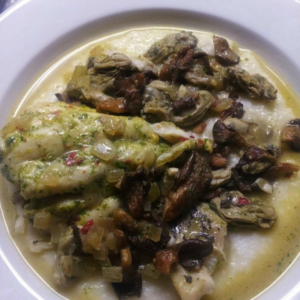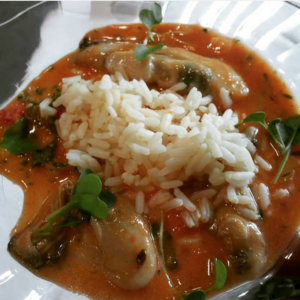TRAVEL with Chef BJ Dennis Join Us for our Low Country Culinary Tour, November 2022!
Gullah Geechee people of the Lowcountry and Sea Islands of the Carolinas, Georgia, and Florida are a special part of the Diaspora community: they have been able to miraculously preserve many of the linguistic patterns and cultural traditions their West African ancestors brought to this country as part of the Transatlantic slave trade.
If you are looking for a Gullah Geechee culinary ambassador someone who both lives and studies Gullah Geechee foodways search no further than Chef Benjamin BJ Dennis. Dennis grew up in Charleston, South Carolina, but his grandparents kept him in touch with the old ways of the Sea Islands with their stories and by cooking him a traditional seafood-based diet (including shark and deviled crab), as well as other classic Gullah dishes like Charleston gumbo (a truer version of its West African counterpart because it doesnt rely on roux as a thickener), and purloo (a versatile rice dish that features anything from seafood to turkey to pork).
As a personal chef and caterer, Dennis has presented at the Charleston Food + Wine Festival, served as a local guide for Anthony Bourdain on CNNs Parts Unknown, re-enacted renowned 19th century African American caterer Nat Fullers historic Civil War feast, and held pop-up dinners at acclaimed local establishments such as Butcher & Bee and Husk Restaurant. He has a cookbook in the works a collaboration with Up from Souths Nicole Taylor and founding editor of the Charleston City Paper, Stephanie Barna. He also dreams of opening a dual cultural center and restaurant that celebrates and educates his patrons about Gullah Geechee cuisine. We caught up with Dennis recently to talk about how his heritage has played a fundamental role in not only shaping his career as a chef, but how it has connected to him personally to the African Diaspora.
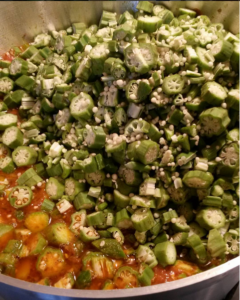 Oldways: Lets start with a basic question. Can you unpack the distinction between Gullah and Geechee culture and cuisine What do they have in common How are they different
Oldways: Lets start with a basic question. Can you unpack the distinction between Gullah and Geechee culture and cuisine What do they have in common How are they different
Benjamin Dennis: We [Gullah Geechee] people say we are descendants of the Gullah people. Pure Gullah [language] is basically Africanisms and African dialect. Geechee is the English derivative, what we say is slang. You can hear the Gullah language and Gullah cadence in the way we speak in Geechee. As far as the foodways theres no difference.
OW: What does the phrase Lowcountry cuisine mean to you How is it distinct from Gullah Geechee cuisine From soul food
BD: When you talk about Lowcountry cuisine, its [influenced by] Africans, the French, the English, the Spanish, and the Native Americans. I always say that Lowcountry cuisine and Gullah Geechee cuisine are similar except Gullah people eat way more seafood. We live of the land. Im not going to deny the eating of pork, but it was a seasonal thing and the pork that was eaten back then is night and day to what is eaten right now.
The main thing is Gullah food is a lot more slow cooking , one-pot cooking, living of the land, the use of the benne seed, the use of ground nuts. Gullah cuisine is [also] a lot more of the African Diaspora, you see a lot more of the Caribbean flavors. What you have to realize about Charleston is that it was a funny city. In the colonial period, you had a lot of people who were coming through enslaved and free, coming through from the islands.
[As for] soul food, [it] is rooted of course in Creole and Louisiana, Gullah Geechee here and the Lowcountry cuisine in Carolina and Georgia, but what we are seeing now is what has become mainstream. I’ll tell people all the time, macaroni and cheese is not our food. You may like it, but its not our food.
OW: What was it about living and working on the Caribbean island of St. Thomas that was such a turning point for you in terms of rediscovering the Gullah Geechee cuisine of your grandparents
BD: It was home. It was that connection. It was knowing that Denmark Vesey came from St. Thomas. When I first moved to the island, when I get really animated, my accent gets really thick. And I used to get nervous because Id think I don’t want these people to think Im trying to sound like them. And then theyd be like, Where are you from Are you from down island somewhere Are you from St. Lucia, are you from Barbados And Id be like, No Im from Charleston, and their eyes would light up and theyd be like, Wow, are you one of those Gullah Geechee people Are you Gullah Wow, we’re family. And it blew my mind. And they’d start talking to me about my culture telling me stuff about my culture that I did not even know, and Id say, wow, Ive got something important back home that I didn’t even know. It made me proud. We are really all one.
OW: Youve gotten very deep into historical research. What are some of your most surprising or interesting discoveries And how have those helped guide your work in the kitchen and in your community
BD: [University of South Carolina historian] Dr. David Shields has been going through old recipe collections and farmer catalogs from the colonial period. We found the indigenous rice that was from West Africa, not the stuff that came from Southeast Asia. And we’re now finally admitting that Carolina Gold rice might have been an original grain from West Africa. The ancestors are truly speaking and they want us to get the facts out there. We weren’t documented people. It was illegal for us to read or write, it was illegal for them to teach us how to read or write, so you know, when we look at these cookbooks, we gotta look at them with a grain salt, we have to look at them through the European wife’s mind state, what she might have seen and what she might have been told. There’s a recipe called brown oyster stew that uses ground benne seed, benne powder: that’s [Gullah Geechee] people.
We’re more than fried chicken, we’re more than mac & cheese, and that yeah, we might be the rice culture that [Africans] made [Charleston] rich because of our skills but we ate more than rice. We brought millet with us, we brought all these different grains with us. It might not have been your grandmother, she might have had bits and pieces of it, but her grandmother, and their great-grandparents had a whole different way of eating because they had to live of the land.
OW: If you wanted someone to have the real deal Charleston experience, as opposed to the glossy touristy one, where and what would you recommend that they do, go, and see Think of it as your version of the New York Times 36 Hours in Charleston.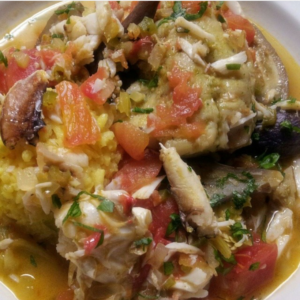
BD: I think the local seafood markets still hold a lot of the old ways. My favorite is Ravenel Seafood. You go up there and they have a whole menu, theyre doing things like conch stew and clam stew, you can get your fish cleaned to order and theyll fry or steam it, they have the red rice, the okra stew, the crab rice, the fried fish, things like that. Places like Buckshots in McClellanville, which is a deep area rooted in Gullah Geechee culture, its pretty much farm-to-table, the family owns the farm, and you see the vegetables brought in, they for the most part are keeping the culture alive through their foodways. You have the soul spots that still have Gullah dishes, like Berthas Kitchen, where you can get turkey purloo or field peas, or Ms. Martha Lou, shell have the purloo, or youll see the collard greens, things like that. We have little nooks and crannies all over the place.
OW: Benne seeds are everywhere in Charleston, but maybe not all the chefs using them are grounded in the their cultural and historical usage and significance. How do you balance promoting and sharing traditional foods with a wider audience and making sure that they get their proper due and respect
BD: I’ve got an old document that was saying that the enslaved ancestors used benne, and ground it up to a powder to put in their soups and stews. If you look at Nigeria, they use egusi [melon seeds] to do what To thicken. See these are the parallels, but we dont know these things. The more we assimilated, and the more we modernized, the more we lost.
You have to let [these chefs] know that this is traditionally what our ancestors did. If you follow me on Instagram, which is my main outlet, [youll see that] this is what it is, this is what these things were brought here for, and this is my ancestral lineage. So you have to let them know as someone who lives it, breathes it. As someone who comes from those roots and comes from this culture.
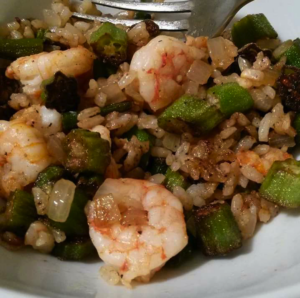 OW: How much as a chef do you balance tradition and innovation And when you are innovating, how do you make sure that you stay true to your roots
OW: How much as a chef do you balance tradition and innovation And when you are innovating, how do you make sure that you stay true to your roots
BD: Just respecting the ingredient. You can always innovate but when you taste it you want to feel a similarity; you want to taste something similar that rings in your soul. It may be deconstructed, but when you eat, it taps back into a spiritual DNA, it taps back into the taste buds that you grew up on, and sometimes, innovation is bringing back dishes and old ways, and it rings into your soul. I just introduced myself back to ground benne and to ground peanuts, and making it into stews, but when I taste it, theres something that rings.
Johnisha Levi, Oldways African Heritage program assistant


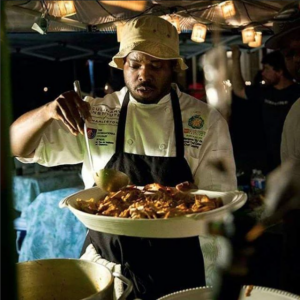 Details
Details